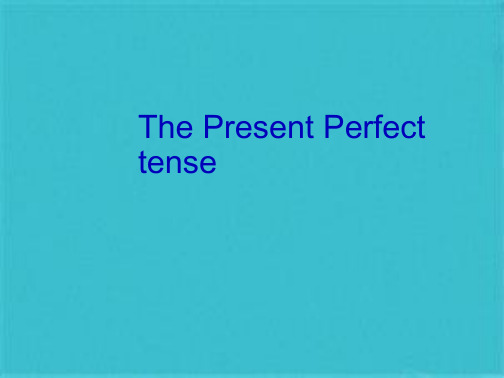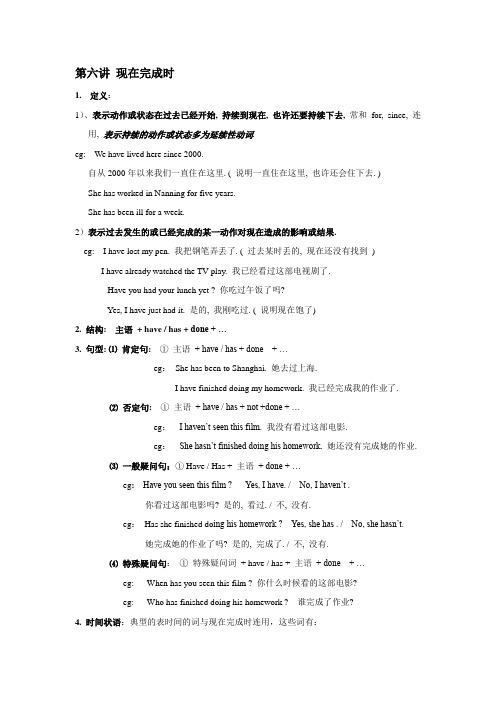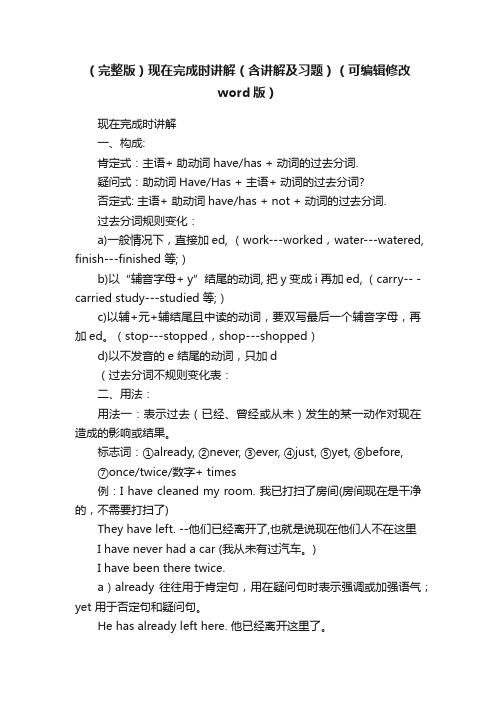现在完成时专题讲解
现在完成时讲解(完整版)(共17张PPT)

4. My friends haven’t visited me ___s_in_c_efew days ago.
5. We haven’t used our car _____faorlong time .
I have planted all the trees. 注:主语假设是第三人称单数助动词用 has
finished 9. goes 10. have, found 11. is He’ll be back soon.
Where’s Li Ming ? He __________ (go) to the teacher’s office.
否认形式 haven’t ( have not 〕 +过去分词 I ________ (see) it last week.
Where’s Li Ming ? He __________ (go) to the teacher’s office.
hasn’t ( has not ) +过去分词 have, stayed 8.
have, finished
have, stayed
• 1. have, seen, saw 2. Has, finished 3. has, —Yes, I ___________ New York twice.
You have planted all the trees. since: (自…以来)
6. She hasn’t had a good cup of coffee _____yefaorrs.
7. Tom has worn glasses _______he was 7 years old. since
现在完成时的用法详解英语

• Is your father in ?
•
No, heha__s_g__o_n__e__t_o___ to Shenzhen.
•
H__a__s___he everb_e_e__n__ there before ?
•
Yes, heh_a_s__b_e__e_n_____ there several times
ago.
A. Did…copy…did
B. Have…copied…have
C. Have…copied…did D. Did …copy…had
5. “Why _A_____ she _______ angry ?”
“Because he _____ at her just now .”
A. did…get…shouted B. has…got…shouted
A. Have…gone to B. Have…gone in
C. Have…been to D. Have …been in
3. My brother _C___college for over three years.
A. has gone to B. has been to C. has been at
但是不能和表示一段时间的状语连用。
短暂性动词变延续性动词:
• join --- be in / a
2) comeb-e-- in / at
• 3) borrow ---keep 4) buy -h-a-ve
5) arrive ---be
6) leave b--e- away (from)
7) begin --b- e on
• It has been colds_in__c_e__ two weeks ago.
英语语法-现在完成时讲解

第六讲现在完成时1.定义:1)、表示动作或状态在过去已经开始, 持续到现在, 也许还要持续下去,常和for, since, 连用, 表示持续的动作或状态多为延续性动词.eg: We have lived here since 2000.自从2000年以来我们一直住在这里. ( 说明一直住在这里, 也许还会住下去. )She has worked in Nanning for five years.She has been ill for a week.2)表示过去发生的或已经完成的某一动作对现在造成的影响或结果.eg: I have lost my pen. 我把钢笔弄丢了. ( 过去某时丢的, 现在还没有找到)I have already watched the TV play. 我已经看过这部电视剧了.--- Have you had your lunch yet ? 你吃过午饭了吗?--- Yes, I have just had it. 是的, 我刚吃过. ( 说明现在饱了)2. 结构: 主语+ have / has + done + …3. 句型: ⑴肯定句: ①主语+ have / has + done + …eg:She has been to Shanghai. 她去过上海.I have finished doing my homework. 我已经完成我的作业了.⑵否定句: ①主语+ have / has + not +done + …eg:I haven’t seen this film. 我没有看过这部电影.eg:She hasn’t finished doing his homework. 她还没有完成她的作业.⑶一般疑问句:① Have / Has + 主语+ done + …eg: Have you seen this film ? Yes, I have. / No, I haven’t .你看过这部电影吗? 是的, 看过. / 不, 没有.eg:Has she finished do ing his homework ? Yes, she has . / No, she hasn’t.她完成她的作业了吗? 是的, 完成了. / 不, 没有.⑷特殊疑问句:①特殊疑问词+ have / has + 主语+ done + …eg: When has you seen this film ? 你什么时候看的这部电影?eg: Who has finished doing his homework ? 谁完成了作业?4. 时间状语:典型的表时间的词与现在完成时连用,这些词有:for 、since、already、yet、ever、never、recently、just、before、so far、by now、once ,twice…等连用.注意: for+一段时间since+过去的某一个时间点I have lived in Nanning for ten years.I have lived in Nanning since ten years ago/ 2002.I haven’t seen him for 15 years .I have never seen him since 1998.already :用于肯定句, 可放在助动词之后、过去分词之前,也可放在句末.I have already finished my homework.yet: 用在疑问句中意为”已经”, 用在否定句中表示”还”, 常放在句末.Have you finished your homework yet?I haven’t finished my homework yet.ever: 曾经用于疑问句中:Have you ever been to Beijing?Have you ever been to Shanghai ? 你去过上海吗?never: 未曾从未I have never traveled by plane before. 我以前从来没有乘飞机旅行过.recently:最近用于肯定否定疑问句中I have been busy recently.We have not seen Tom recently.Have they been here recently.eg: I have just seen Tom.I haven’t heard of it before. 我以前从来没有听说过这件事.They have planted 2000 trees so far.The child has learned 100 English words by now.5. 当与一段时间连用时, 经常用for 加一段时间, 这时候谓语动词一定要用延续性的.非延续性动词----延续性动词改错:They have got married for ten years. I have borrowed this book for a week.get married--- be married borrow --- keepcome ---- be here go --- be away / off buy --- havestart / begin --- be on leave --- be away die --- be deadarrive---be in/at join---be in /be a member of stop---be overreturn----be back open/close---be closed/openeg: He came here three days ago. 他三天前来的这. (一般过去时)He has been here for three days. 他来这已经三天了.(现在完成时与一段时间连用, 非延续性动词变延续性动词. )He went to Dalian last week. 他上周去的大连. ( 一般过去时)He has been away for a week. 他已经离开有一周了. ( 现在完成时)I bought the book last month. 我去年买的这本书. ( 一般过去时)I have had the book for a month. 我保管这本书有一周了. ( 现在完成时)The football match started an hour ago.The football match has been on for an hour.7. 现在完成时与一般过去时的区别:1)、侧重点不用,现在完成时是与现在有关的时态,侧重于过去的动作对现在造成影响,而一般过去时是一种过去的时态,侧重于表示过去的动作,与现在无关。
初中现在完成时讲解ppt

since
for
since
for
since
练习题: 1.It's a long time since we ____ (meet) last, isn't it? 2.--I know you ___________ (choose) a picture book among these. --Yes,Have a look at it, please. 3.So far, spaceships without people ___________ (reach) the moon and some other parts of the universe. 4.My father____ home for nearly three weeks. A.has gone away from B.has left C.has been away from D.went away 5.Mr. and Mrs. Green have_____in China for a week. A.been B.got C.arrived D.reached
eg.--- I’ve lived here for 15 years. eg.--- I’ve lived here since 15 years ago(1990)
选用for和since填空: 1.We haven’t seen each other ______ a long time. 2.His father has been in the factory ______ 10 years ago. 3.The film has been on ______ 20 minutes. 4.Mr Green has worked here ______ he came to China. 5.His grandparents have been dead ______ several years. 6. It’s five years _______ we met last time
(完整版)现在完成时讲解(含讲解及习题)(可编辑修改word版)

(完整版)现在完成时讲解(含讲解及习题)(可编辑修改word版)现在完成时讲解一、构成:肯定式:主语+ 助动词have/has + 动词的过去分词.疑问式:助动词Have/Has + 主语+ 动词的过去分词?否定式: 主语+ 助动词have/has + not + 动词的过去分词.过去分词规则变化:a)一般情况下,直接加ed, (work---worked,water---watered, finish---finished 等;)b)以“辅音字母+ y”结尾的动词, 把y 变成i 再加ed, (carry-- -carried study---studied 等;)c)以辅+元+辅结尾且中读的动词,要双写最后一个辅音字母,再加ed。
(stop---stopped,shop---shopped)d)以不发音的e 结尾的动词,只加d(过去分词不规则变化表:二、用法:用法一:表示过去(已经、曾经或从未)发生的某一动作对现在造成的影响或结果。
标志词:①already, ②never, ③ever, ④just, ⑤yet, ⑥before,⑦once/twice/数字+ times例:I have cleaned my room. 我已打扫了房间(房间现在是干净的,不需要打扫了)They have left. --他们已经离开了,也就是说现在他们人不在这里I have never had a car (我从未有过汽车。
)I have been there twice.a)already 往往用于肯定句,用在疑问句时表示强调或加强语气;yet 用于否定句和疑问句。
He has already left here. 他已经离开这里了。
Has he already left here? 他(真的)已经离开这里了吗?(表示加强语气)My teachers haven’t had breakfast yet. 我的老师们还没有吃早饭。
现在完成时专项讲解及练习

时态专题之现在完成时第一部分:现在完成时概述现在完成时的结构:现在完成时的结构是“ have / has+ 动词的过去分词”。
过去分词的变化分规则与不规则两种。
规则变化与过去式相同,不规则变化需要另记。
现在完成时的用法:1)过去发生或已经完成的动作或存在的状态对现在造成的影响或结果。
(即它的"完成用法")e.g. I have just cleaned the classroom.2)过去已经开始,一直持续到现在的动作或状态。
注意:此时动作可能还要继续。
(即它的"未完成用法")。
E.g. He has lived in Beijing for ten years.现在完成时的句型变换A. 现在完成时的否定句是在have / has后边加not,变一般疑问句是把have / has提前。
E.g. I have ridden a horse.I have not ridden a horse.Have you ridden a horse?B.现在完成时的时间状语通常为already, just, yet, ever, never, before等。
另外还可和since+表过去的时间点,for+时间段连用。
做题时常见错误如下:一、易丢掉have / has例:He taken (take) the medicine before.Correction:________________解析:have/has 为助动词,起构成时态的作用,是不能省略的。
二、have与has易用混例:I has never heard (hear) of that before.Correction:________________解析:现在完成时与一般现在时一样也有单三人称的变化,当单三人称作主语时用has, 一般人称作主语时用have.三、延续性动词与短暂性动词易弄错例:She has left (离开) for 2 hours.Correction:________________解析:在肯定句中,与since或for引出的时间状语连用的是延续性动词,不能是短暂性动词,但在否定句中短暂性动词也是可以的。
初中英语现在完成时讲解全(共24张PPT)

I studied English ten years ago.
(come来到某地….
left the team
has been on C.
表示动作发生在过去,对现在造成的影响。
)
be over
went to bed
填空使用for和since
Tom ___for several hours.
表示动作发生在过去,对现在造成的影响。
• She has lived here ______1996.
• 2 标准词:so far/up to now (到目前为止) ;lately/recently(最近)
• Up to now/So far ,I haven’t been successful.
• Lately/Recently,I haven’t seen my teacher.
3. He bought the motorbike a month ago.
---He ____ ____ the motorbike for a month. 4. He arrived here three days ago.
--- He ____ ____ here since three days ago. 5. They turned off the light 2 hours ago.
(finish结束....)
be over
1.我买这本书三年了。Buy I have bought the book.
(1) I have had the book for 3 years. (2) I have had the book since 3 years ago.
了borrow He has borrow the book. (1)He has kept the book for 2 months . (2) He has kept the book since 2 months ago.
现在完成时讲解

标志二.(把握当前): today, this morning, this week
他今天做了很多工作吗? Has he done much work today? 你们这星期开心吗? Have you been happy this week?
8
Exercise
B ① Both his parents look sad today. Maybe they ____what's happened to him . A. knew B. have known C. must know D.will know ② I didn't want to see the movie this morning because I ____it. C A.see B.saw C.have seen D.had seen
Exercise
C in this city since he was born. 1. My grandfather _____ A.had lived B.lived C.has lived D.lives D him for a long time. 2. -How is your father? I ____ - he is fine,but busy. A.don’t see B.hadn’t seen C.didn’t see D.haven’t seen
2.这是我第二次从一个电影中学到这么多.
That is the second time I have learnt so much f用在下列结构中:
②. This (It…) is (was) +形容词最高级+ n +完成时 “到现在为止是最…的”
1.你是我见过最棒的老师! You are the best teacher that I have ever met. 2.那是我见过的最大的猪. That was the biggest pig that I had seen. 3.那是我听过最美妙的音乐. It was the sweetest music (that) I had heard.
- 1、下载文档前请自行甄别文档内容的完整性,平台不提供额外的编辑、内容补充、找答案等附加服务。
- 2、"仅部分预览"的文档,不可在线预览部分如存在完整性等问题,可反馈申请退款(可完整预览的文档不适用该条件!)。
- 3、如文档侵犯您的权益,请联系客服反馈,我们会尽快为您处理(人工客服工作时间:9:00-18:30)。
现在完成时态专题讲解一、注意理解时态的两层意义及不同意义对应的标志词观察一:请仔细观察下列句子。
1.I have already finished reading the book.(现在我了解了书的内容).2.Have you had lunch yet? Yes, I have.(我现在不饿了).3.He has never seen the film before. (现在他不了解电影的内容)4.I have just washed my car.(现在车很干净了)5.I have seen the film three times. (我现在了解电影的内容)思考一:现在完成时表达的含义:1)表示在发生或已经结束的动作对造成的影响或结果标志词:常与already(已经),yet(已经),just(刚刚),before,ever(曾经),never,three times等词连用。
常用于肯定句中, 常用于否定句,疑问句句尾。
练习、翻译以下句子1、你已经找到你的书了吗? (find-found your book)2、他们已经在这个城市建了许多房子. (build-built many buildings)3、Judy还刚到达. (arrive-arrived)观察二:请仔细观察以下句子1.We have been in Qi Bin Middle School since 2013.(我们还在淇滨中学)2.He has learned English for 5 years/since 5 years ago/since I was in primary school.(他还在继续学习英语)3.China has made great changes these years/up to now/so far.(现在还在发生变化)思考二:现在完成时表达的含义:2)表示在过去已经开始并到现在。
可能已经结束,也可能将会继续持续下去的动作或状态. 标志词:常与for, since,these years, recently(最近),up to now/until now/so far(到现在),in the past/last years,(在过去几年) 等引导的短语或从句连用.★since 用来说明动作起始时间—“自从……”for 用来说明动作延续时间长度—“长达……”1)since+时间点He has stayed here since (五点钟).2)since+ 时间段+ agoHe has stayed here since (五个小时前).3)since+ 从句(从句用一般过去时)She has taught English since (自从他来这里).★for+ 时间段He has kept the book (长达两周时间).注意:并非有for /since作为时间状语的句子都用现在完成时I worked here for more than twenty years. (我现在已不在这里工作。
)I have worked here for many years.(现在我仍在这里工作。
)It is two years since the old man died. (老人去世已有两年了。
)=Two years has passed since the old man died.练习、用for 或since填空1、Mr. Brown has had his TV ________ 15 years.2、I’ve taken driving lessons _________ last month.3、My sister has had her cell phone ________ a month .4、My friends haven’t visited me ___________ my birthday.5、We haven’t used our car ________ a long time .6、She hasn’t had a good cup of coffee _________ years.7、Tom has worn glasses _________ he was 7 years 。
二、理解现在完成时的基本结构和各种句式观察三:仔细观察课本110页现在完成时态表格一思考三:现在完成时的肯定句,否定句,疑问句分别是怎样构成的?★总结:现在完成时态的构成:基本结构: 。
肯定式:_____________________否定式:___________________________疑问式:______________________肯定回答___________否定回答________练习、按要求改变句子。
1.She has done her homework. (改否定句)2.The rain has already stopped. (改一般疑问句)★动词的规则变化(1)一般动词,在词尾直接加“”。
“直”work---worked---worked , visit---visited---visited(2)以“e ”结尾的动词,只在词尾加“”。
“去”live---lived---lived argue--argued--argued(3)重读闭音节结尾,末尾只有一个辅音字母,先双写该辅音字母再加““双”stop---stopped---stopped , drop---dropped--dropped(4)以“辅音字母+ y ”结尾的动词,将"y"变为"i" ,再加“”。
“改”study---studied---studied , cry---cried---cried★注意:规则动词的过去分词的变化与过去式是一样的!练习、写出下列动词的过去式和过去分词Live ______ ______ Stay ______ ______ plan ______ ______Clean ______ ______ worry ______ ______★不规则动词可参考书本141-142页的表格将过去分词按照以下分类:AAA AAB ABB ABA ABC三.一般过去时与现在完成时的区别1)一般过去时表示过去某时发生过了的动作或单纯叙述过去的事情,强调在过去发生的动作;与现在无关。
现在完成时也表示过去某时发生了某动作,并且该动作对现在造成了影响,强调的是过去发生的动作对现在造成的影响。
I saw this film yesterday.(强调看的动作在昨天发生过了。
)I have seen this film. (强调对现在的影响,电影的内容已经知道了。
)2)一般过去时常与具体的表示过去的时间状语连用:yesterday,last week,…ago,in1990,in October, just now,,现在完成时通常与模糊的时间状语连用,或无时间状语:(1)ever, never, just, before, yet, already, ...times(...次)(2)for, since, so far, till/until/up to now, in the past/last few years, recently,句子中如有具体的过去时间(如yesterday, last, week, in 1960)时,不能使用现在完成时,要用过去时(错)Tom has written a letter to his parents last night.(对)Tom wrote a letter to his parents last night.四.比较延续动词与瞬间动词1.延续性动词:表示能够延续的动作,如:learn, work, stand, lie, know, walk, keep, have, wait, watch, sing, read, sleep, live, stay等。
用法:延续性动词可以与表示时间段的状语连用。
如:for+一段时间:for 2 years;since从句,since he came here;since+时间点名词,since last year,since 5 days ago; how long; for a long time等。
2.非延续性动词:也称终止性动词、瞬间动词,表示不能延续的动作,这种动作发生后立即结束。
如:open, die, close, begin, finish, come, go, move, borrow, lend, buy等。
用法:①非延续性动词一般与表示时间点的状语连用,如:two years ago; at 5 o'clock;例:He died 5 years ago.②非延续性动词在也可以与表示时间段的状语连用,如:for two yearsIt is 4 years since I came here. 从我到这里已经四年了。
③非延续性动词在现在完成时态中的运用。
在现在完成时的第二种用法中,若表示某动作从过去持续到现在,一般用延续性动词。
短暂性动词也可以用在现在完成时中,但是需要注意句型:1.否定句中可以直接与时间段连用。
I haven’t bought books for two years.2.肯定句和疑问句中,用相应的延续性动词替换。
如:1.The old man died 4 years ago.--The old man has been dead for 4 years.2.He joined the Party2 years ago.--He has been in the Party for 2 years3.I bought the book 5 days ago.--I have had/the book for 5 days.begin/start --- be on die --- be dead finish --- be overopen sth ---sth be open fall ill --- be ill get up---be upcatch a cold--have a cold come here--be here begin to do--dogo there --- be there become--be come back--- be backfall asleep --- be asleep get to/ arrive/reach --- be (in)leave --- be away from get to know --- know borrow--keepgo (get) out →be out put on→ wear close--be closed五、比较have/has been to have/has gone to have/has been inhave/has been to 去过,有去有回have/has gone to 去了,有去无回have/has been in 停留一段时间He went to Shanghai last week 上周他去了上海。
